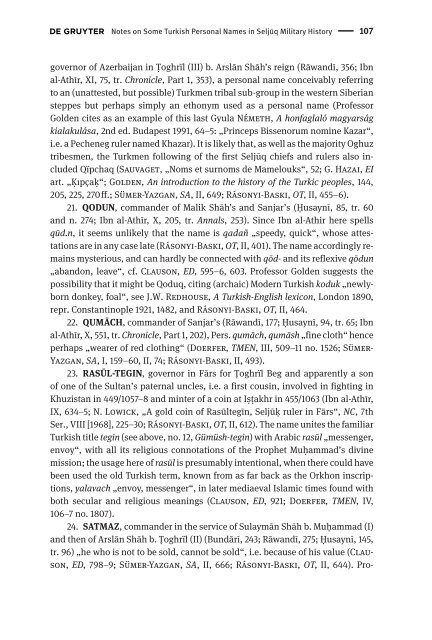0021-1818_islam_98-1-2-i-259
0021-1818_islam_98-1-2-i-259
0021-1818_islam_98-1-2-i-259
Create successful ePaper yourself
Turn your PDF publications into a flip-book with our unique Google optimized e-Paper software.
Notes on Some Turkish Personal Names in Seljūq Military History 107<br />
governor of Azerbaijan in Toghrïl (III) b. Arslan Shah’s reign (Rawand\, 356; Ibn<br />
al-Ath\r, XI, 75, tr. Chronicle, Part 1, 353), a personal name conceivably referring<br />
to an (unattested, but possible) Turkmen tribal sub-group in the western Siberian<br />
steppes but perhaps simply an ethonym used as a personal name (Professor<br />
Golden cites as an example of this last Gyula Németh, A honfaglaló magyarság<br />
kialakulása, 2nd ed. Budapest 1991, 64–5: „Princeps Bissenorum nomine Kazar“,<br />
i.e. a Pecheneg ruler named Khazar). It is likely that, as well as the majority Oghuz<br />
tribesmen, the Turkmen following of the first Seljuq chiefs and rulers also included<br />
Qïpchaq (Sauvaget, „Noms et surnoms de Mamelouks“, 52; G. Hazai, EI<br />
art. „Kıpçak“; Golden, An introduction to the history of the Turkic peoples, 144,<br />
205, 225, 270ff.; Sümer-Yazgan, SA, II, 649; Rásonyi-Baski, OT, II, 455–6).<br />
21. QODUN, commander of Malik Shah’s and Sanjar’s (0usayn\, 85, tr. 60<br />
and n. 274; Ibn al-Ath\r, X, 205, tr. Annals, 253). Since Ibn al-Athir here spells<br />
qud.n, it seems unlikely that the name is qadañ „speedy, quick“, whose attestations<br />
are in any case late (Rásonyi-Baski, OT, II, 401). The name accordingly remains<br />
mysterious, and can hardly be connected with qod- and its reflexive qodun<br />
„abandon, leave“, cf. Clauson, ED, 595–6, 603. Professor Golden suggests the<br />
possibility that it might be Qoduq, citing (archaic) Modern Turkish koduk „newlyborn<br />
donkey, foal“, see J.W. Redhouse, A Turkish-English lexicon, London 1890,<br />
repr. Constantinople 1921, 1482, and Rásonyi-Baski, OT, II, 464.<br />
22. QUMACH, commander of Sanjar’s (Rawand\, 177; 0usayn\, 94, tr. 65; Ibn<br />
al-Ath\r, X, 551, tr. Chronicle, Part 1, 202), Pers. qumach, qumash „fine cloth“ hence<br />
perhaps „wearer of red clothing“ (Doerfer, TMEN, III, 509–11 no. 1526; Sümer-<br />
Yazgan, SA, I, 159–60, II, 74; Rásonyi-Baski, II, 493).<br />
23. RASUL-TEGIN, governor in Fars for Toghrïl Beg and apparently a son<br />
of one of the Sultan’s paternal uncles, i.e. a first cousin, involved in fighting in<br />
Khuzistan in 449/1057–8 and minter of a coin at Istakhr in 455/1063 (Ibn al-Ath\r,<br />
IX, 634–5; N. Lowick, „A gold coin of Rasulteg\n, Seljuk ruler in Fars“, NC, 7th<br />
Ser., VIII [1968], 225–30; Rásonyi-Baski, OT, II, 612). The name unites the familiar<br />
Turkish title tegin (see above, no. 12, Gümüsh-tegin) with Arabic rasul „messenger,<br />
envoy“, with all its religious connotations of the Prophet Mu1ammad’s divine<br />
mission; the usage here of rasul is presumably intentional, when there could have<br />
been used the old Turkish term, known from as far back as the Orkhon inscriptions,<br />
yalavach „envoy, messenger“, in later mediaeval Islamic times found with<br />
both secular and religious meanings (Clauson, ED, 921; Doerfer, TMEN, IV,<br />
106–7 no. 1807).<br />
24. SATMAZ, commander in the service of Sulayman Shah b. Mu1ammad (I)<br />
and then of Arslan Shah b. Toghrïl (II) (Bundar\, 243; Rawand\, 275; 0usayn\, 145,<br />
tr. 96) „he who is not to be sold, cannot be sold“, i.e. because of his value (Clauson,<br />
ED, 7<strong>98</strong>–9; Sümer-Yazgan, SA, II, 666; Rásonyi-Baski, OT, II, 644). Pro-


